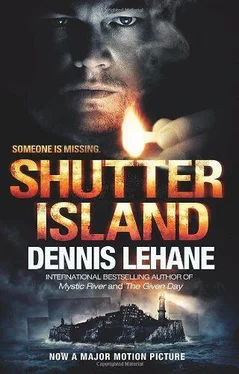His father said, “This is where they hid in the old days.” His arm swept the horizon. “These islands. Hid themselves. Hid their gold.”
Teddy imagined chests of it, the coins spilling down the sides.
Later he got sick, repeatedly and violently, pitching black ropes of it over the side of his father’s boat and into the sea.
His father was surprised because Teddy hadn’t begun to vomit until hours into the trip when the ocean was flat and glistening with its own quiet. His father said, “It’s okay. It’s your first time. Nothing to be ashamed of.”
Teddy nodded, wiped his mouth with a cloth his father gave him.
His father said, “Sometimes there’s motion, and you can’t even feel it until it climbs up inside of you.”
Another nod, Teddy unable to tell his father that it wasn’t motion that had turned his stomach.
It was all that water. Stretched out around them until it was all that was left of the world. How Teddy believed that it could swallow the sky. Until that moment, he’d never known they were this alone.
He looked up at his father, his eyes leaking and red, and his father said, “You’ll be okay,” and Teddy tried to smile.
His father went out on a Boston whaler in the summer of ’38 and never came back. The next spring, pieces of the boat washed up on Nantasket Beach in the town of Hull, where Teddy grew up. A strip of keel, a hot plate with the captain’s name etched in the base, cans of tomato and potato soup, a couple of lobster traps, gap-holed and misshapen.
They held the funeral for the four fishermen in St. Theresa’s Church, its back pressed hard against the same sea that had claimed so many of its parishioners, and Teddy stood with his mother and heard testimonials to the captain, his first mate, and the third fisherman, an old salt named Gil Restak, who’d terrorized the bars of Hull since returning from the Great War with a shattered heel and too many ugly pictures in his head. In death, though, one of the bartenders he’d terrorized had said, all was forgiven.
The boat’s owner, Nikos Costa, admitted that he’d barely known Teddy’s father, that he’d hired on at the last minute when a crew member broke his leg in a fall from a truck. Still, the captain had spoken highly of him, said everyone in town knew that he could do a day’s work. And wasn’t that the highest praise one could give a man?
Standing in that church, Teddy remembered that day on his father’s boat because they’d never gone out again. His father kept saying they would, but Teddy understood that he said this only so his son could hold on to some pride. His father never acknowledged what had happened that day, but a look had passed between them as they headed home, back through the string of islands, Shutter behind them, Thompson still ahead, the city skyline so clear and close you’d think you could lift a building by its spire.
“It’s the sea,” his father said, a hand lightly rubbing Teddy’s back as they leaned against the stern. “Some men take to it. Some men it takes.”
And he’d looked at Teddy in such a way that Teddy knew which of those men he’d probably grow up to be.
TO GET THERE in ’54, they took the ferry from the city and passed through a collection of other small, forgotten islands—Thompson and Spectacle, Grape and Bumpkin, Rainford and Long—that gripped the scalp of the sea in hard tufts of sand, wiry trees, and rock formations as white as bone. Except for supply runs on Tuesdays and Saturdays, the ferry ran on an irregular schedule and the galley was stripped of everything but the sheet metal that covered the floor and two steel benches that ran under the windows. The benches were bolted to the floor and bolted to thick black posts at both ends, and manacles and their chains hung in spaghetti piles from the posts.
The ferry wasn’t transporting patients to the asylum today, however, just Teddy and his new partner, Chuck Aule, a few canvas bags of mail, a few cases of medical supplies.
Teddy started the trip down on his knees in front of the toilet, heaving into the bowl as the ferry’s engine chugged and clacked and Teddy’s nasal passages filled with the oily smells of gasoline and the late-summer sea. Nothing came out of him but small streams of water, yet his throat kept constricting and his stomach banged up against the base of his esophagus and the air in front of his face spun with motes that blinked like eyes.
The final heave was followed by a globe of trapped oxygen that seemed to carry a piece of his chest with it as it exploded from his mouth, and Teddy sat back on the metal floor and wiped his face with his handkerchief and thought how this wasn’t the way you wanted to start a new partnership.
He could just imagine Chuck telling his wife back home—if he had a wife; Teddy didn’t even know that much about him yet—about his first encounter with the legendary Teddy Daniels. “Guy liked me so much, honey, he threw up.”
Since that trip as a boy, Teddy had never enjoyed being out on the water, took no pleasure from such a lack of land, of visions of land, things you could reach out and touch without your hands dissolving into them. You told yourself it was okay—because that’s what you had to do to cross a body of water—but it wasn’t. Even in the war, it wasn’t the storming of the beaches he feared so much as those last few yards from the boats to the shore, legs slogging through the depths, strange creatures slithering over your boots.
Still, he’d prefer to be out on deck, facing it in the fresh air, rather than back here, sickly warm, lurching.
When he was sure it had passed, his stomach no longer bubbling, his head no longer swimming, he washed his hands and face, checked his appearance in a small mirror mounted over the sink, most of the glass eroded by sea salt, a small cloud in the center where Teddy could just make out his reflection, still a relatively young man with a government-issue crew cut. But his face was lined with evidence of the war and the years since, his penchant for the dual fascinations of pursuit and violence living in eyes Dolores had once called “dog-sad.”
I’m too young, Teddy thought, to look this hard.
He adjusted his belt around his waist so the gun and holster rested on his hip. He took his hat from the top of the toilet and put it back on, adjusted the brim until it tilted just slightly to the right. He tightened the knot in his tie. It was one of those loud floral ties that had been going out of style for about a year, but he wore it because she had given it to him, slipped it over his eyes one birthday as he sat in the living room. Pressed her lips to his Adam’s apple. A warm hand on the side of his cheek. The smell of an orange on her tongue. Sliding into his lap, removing the tie, Teddy keeping his eyes closed. Just to smell her. To imagine her. To create her in his mind and hold her there.
He could still do it—close his eyes and see her. But lately, white smudges would blur parts of her—an earlobe, her eyelashes, the contours of her hair. It didn’t happen enough to fully obscure her yet, but Teddy feared time was taking her from him, grinding away at the picture frames in his head, crushing them.
“I miss you,” he said, and went out through the galley to the foredeck.
It was warm and clear out there, but the water was threaded with dark glints of rust and an overall pallor of gray, a suggestion of something growing dark in the depths, massing.
Chuck took a sip from his flask and tilted the neck in Teddy’s direction, one eyebrow cocked. Teddy shook his head, and Chuck slipped it back into his suit pocket, pulled the flaps of his overcoat around his hips, and looked out at the sea.
“You okay?” Chuck asked. “You look pale.”
Teddy shrugged it off. “I’m fine.”
Читать дальше












